The Hyphen Spotlight Series
Exploring the career and life journey of... Bart Fonteyne
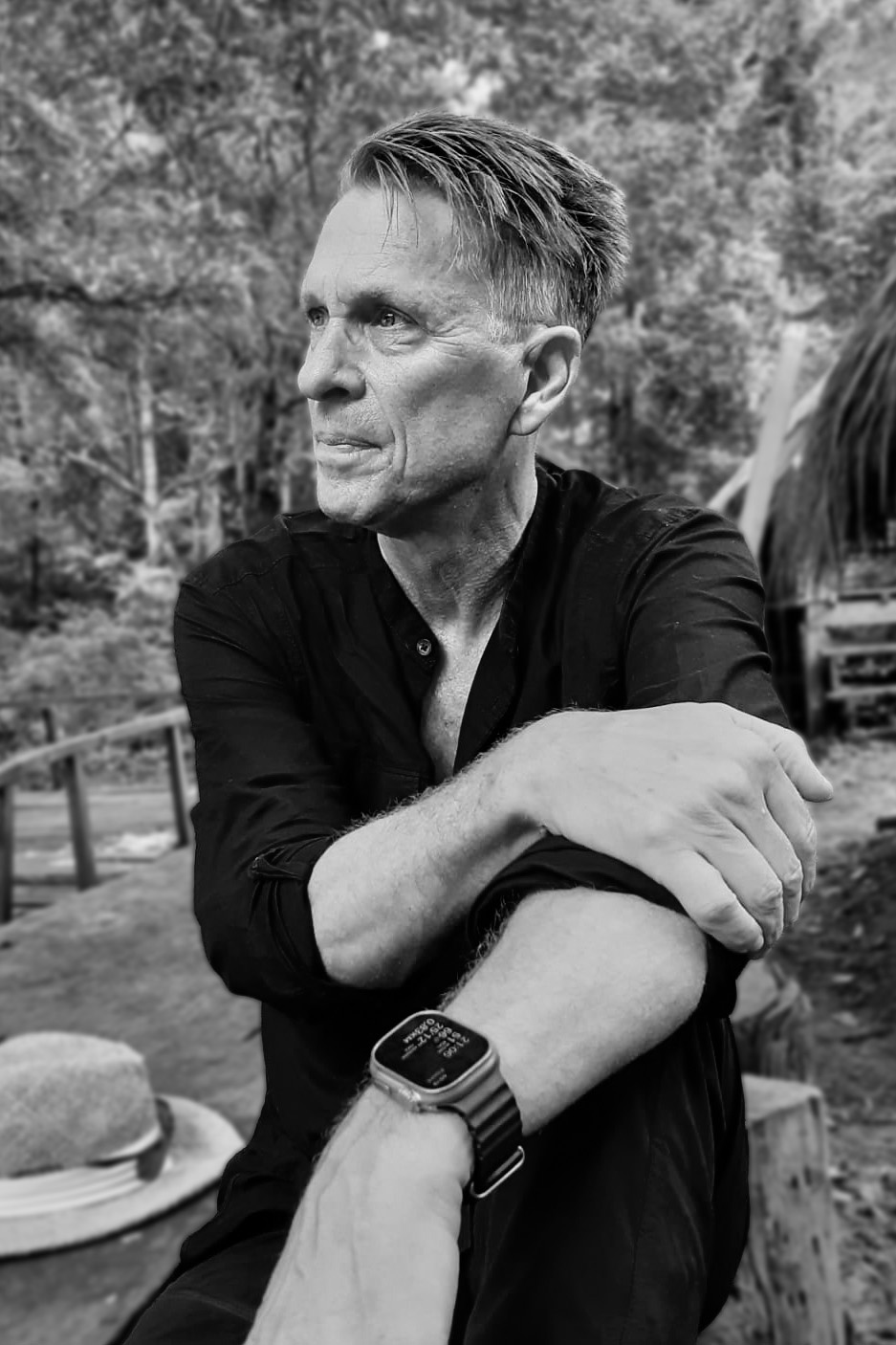
Bart Fonteyne has spent his career at the crossroads of politics, economics and education, navigating complex environments with creativity and strategic clarity.
From negotiating with military leaders in Iraq to reforming higher education in Mozambique, he has thrived where politics and policy collide.
His expertise lies in international development and education, with a sharp focus on aligning strategy, resources and impact across diverse cultures and challenging contexts.
In this Spotlight Series Q&A, Bart shares the lessons learned from a life spent bridging worlds – and why he has always sought a purpose over a job.
HYPHENYou have had quite an interesting career journey, travelling all over the world and working in a few different sectors – how did that all come about?
Bart FonteyneI’ve never really looked for a job – I looked for a life. I had a broad upbringing and broad-minded parents, and I studied languages, history and art. My first diploma was in Oriental Studies but it was completely useless for finding a job unless I pursued a PhD, which wasn’t an option in such a small faculty.
My dilemma was choosing between music and travelling, and ultimately I chose travelling. I still make music in my spare time, but when I had to do my military service, I saw it as a chance to see the world. In Belgium, you could replace military service with working abroad for twice as long, which meant spending 22 months outside Europe training local employees, so I ended up on construction sites in Iraq.
I led a team of Thai electricians and learned a lot about productivity, negotiating and keeping employees happy. They told me the work was going too slowly because they weren’t paid enough, so I asked how much they wanted and what they would give me – they said that for 30% more money, they could go twice as fast, so that was a no-brainer!
The company was happy, and soon I went to the head office in Baghdad, working for the head contractor. The head contractor, however, went bust, and suddenly I was left managing seven sites and 300 people, with nothing but a telex that said the company was bankrupt. I was 25 and completely alone – everyone else happened to be on holiday – and if I wanted to leave Iraq, I knew I needed an exit visa, but I also realised that nobody would be able to leave if word spread.
I got a phone call from a much larger company about securing entry for them and we struck a deal, so together we met Iraq’s military staff. The new owners were lawyers who had never been to Iraq and looked out of place, so I presented them as the new heads of the company and introduced the larger construction firm as their new subcontractor. The military raised the issue of penalties, which could inflate contracts threefold in Iraq. When the new management confirmed that these would be paid, we had a deal with exit visas for everyone and prospects for continuing employment in the new company.
That deal meant my 300 workers could go home and return later under the new company. It was my first lesson in surviving a collapse at 25 — and getting out safely in Iraq. After nearly three years there and in Saudi Arabia, I went to Sudan to complete my military service. Six months later, I was back in Europe to study economics. I then joined a computer start-up during the early PC era, selling the first networks in competition with IBM.
I spent three years in IT before meeting a former colleague from Sudan who was with a consultancy firm responsible for EU projects in Latin America. I asked him to contact me if there was something in Latin America, and he called two months later. I went to Bolivia and that’s how I started in international development.
HYPHENDid that career click instantly for you or were there any teething problems?
Bart FonteyneIn Bolivia, I managed EU projects worth €25–30 million. There were experts working across different domains and I managed all the resources. I loved the lifestyle — small teams working between the government and the EU, which was like operating between tectonic plates. If you had vision and could be strategic, you could have a lot of influence. quickly knew this was for me, but in an administrative role I was still seen as second tier because I wasn’t delivering the project hands-on.
At that point, I began linking monitoring and evaluation with the money. People became uneasy and said, ‘You can’t do that — this is development work’ but I argued it was opportunity cost. For example, in Bolivia, they used expensive stone cages to avoid erosion to save half a hectare for one small farmer, but the investment could never be justified and it was unsustainable. By connecting monitoring and evaluation with return-on-investment calculations, I made people uncomfortable, but I realised I was on to something.
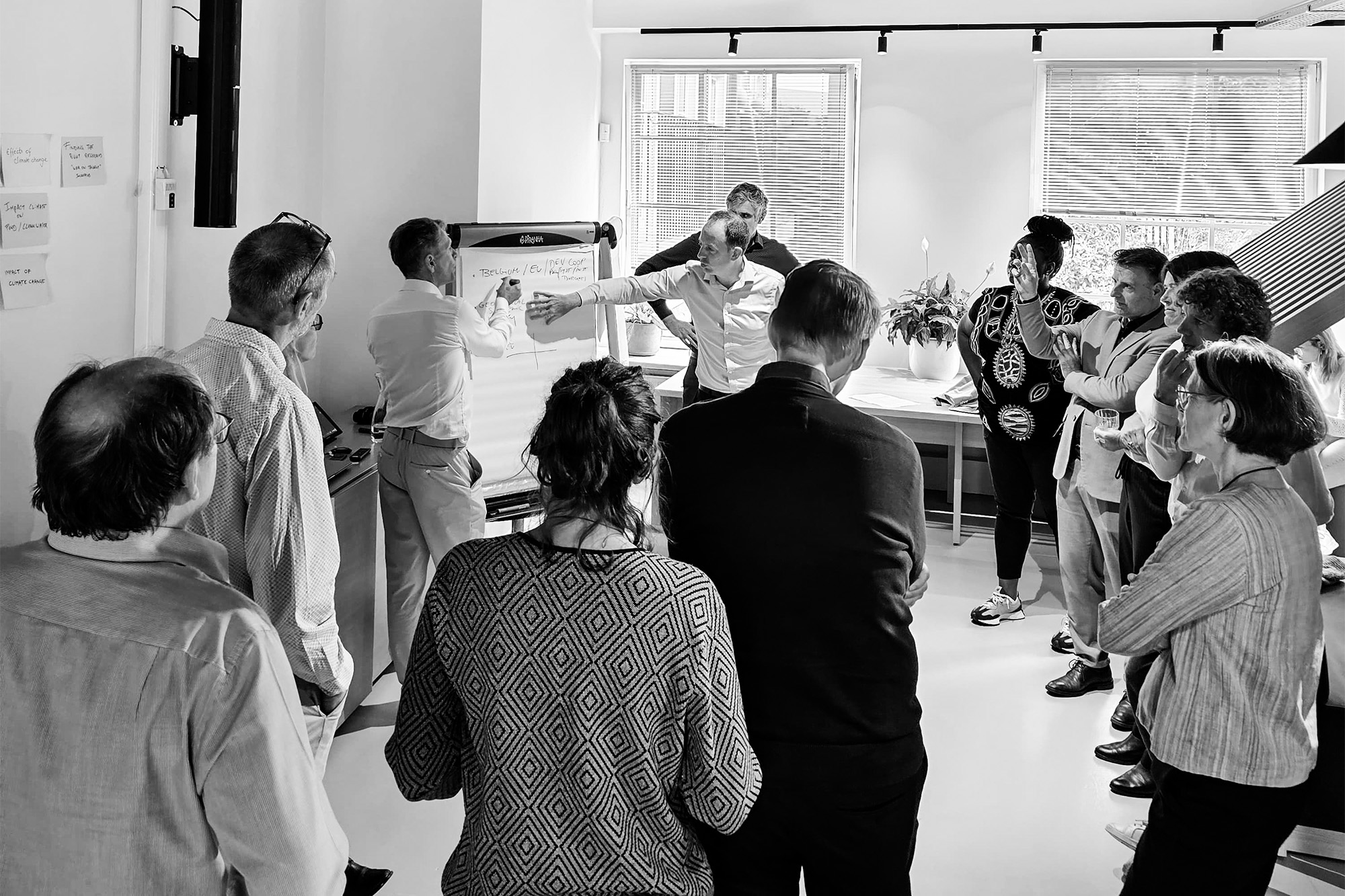
Hyphen Did that initial success inspire you to go further down that particular route?
Bart FonteyneIt’s why I did an MBA – to bring economic thinking and efficiency into development, rather than driving projects on goodwill. Previously, if someone asked and there was budget, something was done; instead, I thought you should look to see if you do something much better with the same amount of money to make the project stronger.
I moved from Bolivia to Yemen, where war broke out so we were evacuated for three months. During that time, I did consultancy work in Cambodia, which had just opened up. That experience made me one of the only people with knowledge of Cambodia, so we won a tender there with my company. I stayed for three-and-a-half years as administrator, setting up systems. I worked closely with the top coordinator to align seven EU projects, and the system I designed was adopted by all of them.
One innovation was accrual-based accounting, which they had never used before because everything had been cash-based. That was difficult for them to grasp – one delegation in Bangkok even panicked and raised concerns, so it was an uphill battle to introduce changes.
By the time I finished my MBA, I was in the Philippines. There I made my first full strategic evaluation and plan. Strategy was my thing, and the EU ambassador confirmed it by telling me, ‘This is what we should do everywhere.’ That feedback was revolutionary and necessary.
After that, I moved to Egypt, where €400 million had been channelled into the Social Fund for Development under the Prime Minister’s office. It was highly political. That is where I received my political education. These were very intelligent people, but their skills were not always used for progress and the system was built on loyalty above all.
HYPHENYou travelled to a lot of places in a comparatively short amount of time – how did you adapt to those different environments so quickly?
Bart FonteyneYou quickly learn it is always about the same things – power, politics, money and international relations. You get this reflex that makes you think, ‘how are things done here?’ and then you start to see the differences and test a few things.
These cultural differences are very important to learn and every country is different. Another thing is you have to be somewhat self-deprecating at the end of the day – you can only do what you can do – and you hope the country makes the right decision.
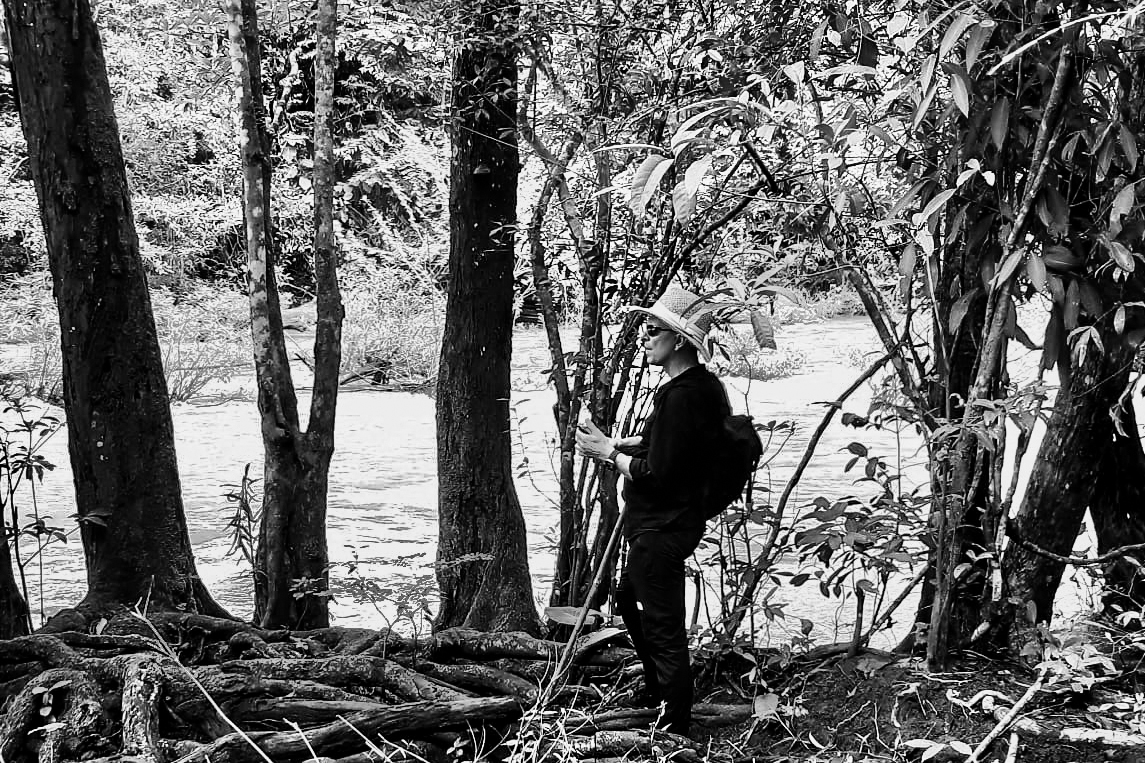
HyphenSo, how do you break through to people when you are in a situation where you are trying to persuade people to see the bigger picture or to keep things going after you leave?
Bart FonteyneYou must make sure you understand the rationale behind their decision-making and that you can align the incentives accordingly, because if you do that, then you can have more of a shoulder-to-shoulder approach. By that, I mean that you will be standing with them, looking at the horizon, testing ideas to see what works, and once you do that, then you are more likely to be working towards the same goal.
Once plans become concrete, you start to see where problems might lie. At that moment, you need to be flexible enough to adapt and convince the donor, and that’s when you do that diplomatic work. There can be quite a lot of that but the more you understand every party’s situation, the better you can stand shoulder to shoulder with each of them simultaneously and find joint solutions that satisfy everyone.
HYPHENHow do you approach working with high-level political figures then?
Bart FonteyneMinisters have a tough job – the higher you go up in decision-making levels, the more alone you are and the more complex everything becomes, so you need to think. At the same time, you are bombarded by the craziness of the day.
There was one instance where I was talking to the minister of higher education in one African country about strategy, but then all of a sudden, I saw he was distracted and on his phone. He said one ethnic group of students had killed students from another group, and he had to deal with that. We stopped for the day as he needed to address that, but he cleared his agenda for us to get back together the next day, which I found amazing.
In principle, ministers should make decisions for the whole of society and for the long term, but day-to-day pressures – politics, election planning, the pull of staying in power – often get in the way.
HYPHENIs that something you have encountered often during your career?
Bart FonteyneI’ll give you one situation as an example because this was an issue in Mozambique. I spent 12 years working on reforming higher education there. During that time, there were three election cycles so that meant restarting with each new minister, and as the next election cycle approached, the reforms tended to falter in the face of the need not to rock the boat and stay in power. It was time-consuming, but finally, it looked like the universities and ministries were aligned – and then a $2bn corruption scandal derailed everything. Donors pulled out, universities lost 30% of their funding, and reforms were halted.
Still, the real satisfaction came from foresight and scenario planning and then having all levels of society together so that they could have a real conversation. I have had that in a couple of countries where I, as an expert, could access all the layers, whereas they are used to their hierarchical levels. So when you bring ministers, academics, and students together and make them talk to each other, that’s when you really get fireworks.
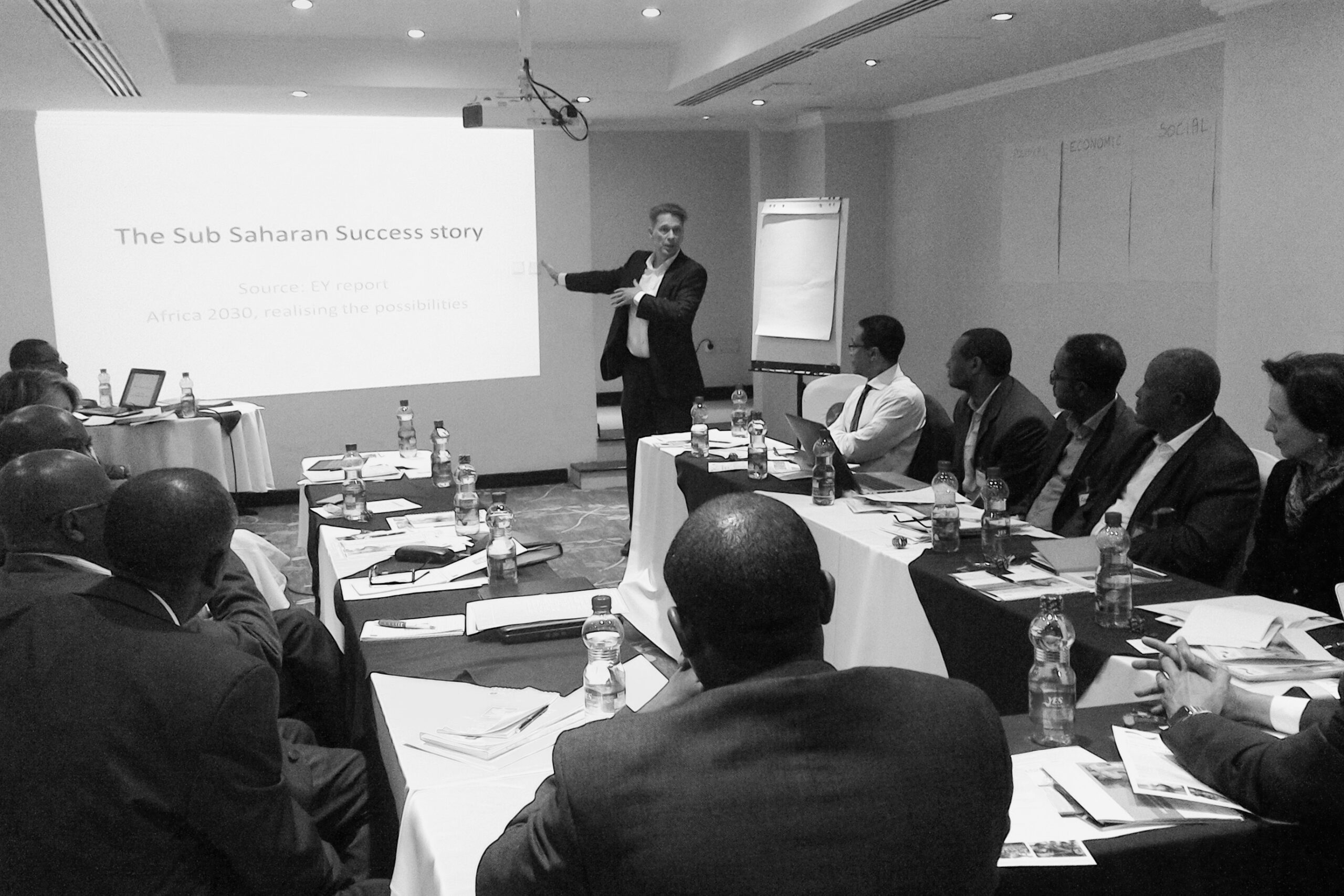
HyphenWhat keeps you motivated to keep working on these projects? How do you approach these quite distinctive engagements?
Bart FonteyneI always feel like you are at the crossroads of economy, society, academia, human nature, power and money. It feels like a political thriller every day.
The relationship between donors and countries is crucial. I try to see things from the countries’ point of view, rather than simply following donor systems and procedures. Too often, solutions are copied and pasted from one place to another, but every country is unique. Recognising that is always a good starting point.
When ministers ask whether something that has been developed has worked elsewhere, I explain that what happens in other places can provide inspiration, but what will work has to be developed by their own people based on deep stakeholder consultations. Lessons can be drawn from other places, but copying systems wholesale does not work. Former colonial systems often still shape structures in Africa, whether French, Portuguese or English. History matters, but ideology is unhelpful.
So much development language can become box-ticking. A single idea can be buried beneath adjectives about gender, equality, or climate change, and these phrases are sometimes added to secure approval, but they can also dilute the real substance. If you cut through the jargon and speak plainly, you build trust.
I never arrive saying, “I’m Western, I know best.” Instead, I ask what leaders want to achieve and why it has not yet happened. That simple shift unlocks honest conversations and valuable information.
Trust and openness are essential, but so is trusting the process. Projects can be messy and unpredictable, but experience teaches you that when you trust the process you set up in the first place, it will help you land on your feet. At worst, you move on to the next project. I do not seek job security; I seek interesting work, and my independence keeps me fearless.
Risk is part of the process, but they are calculated risks. Sometimes you fear the boat will sink, but it does not and it’s weird because there have been times where the most difficult person ends up saving the day, because suddenly it is in their interest. With so many motives in play, someone usually steps up to keep things afloat, so it’s usually an interesting experience.
HyphenThe world has changed a lot over the course of your career – how has that impacted your approach and how you look at the world?
Bart FonteyneI grew up during the Cold War, and by the time Tiananmen Square and the fall of the Berlin Wall happened, I was starting my career. The 1990s felt optimistic – a decade of convergence around universal values, democracy and globalisation – and then 9/11 changed everything. The financial crisis was also misunderstood. Governments didn’t save banks; they lent to them to prevent collapse, and the banks repaid. The pandemic and the rise of China added new disruptions.
Now we have Trump, Brexit, and other shocks. I don’t take sides, but I believe in liberalism. Ideological extremes – whether left or right – see the world as a zero-sum game but I see it differently. Wealth does not necessarily come at others’ expense; it often comes from risk-taking and innovation, which can enlarge the cake for everyone.
The world is full of problems, but I don’t see that as a failure. There will never be an end solution. Every solution today already harbours a problem for tomorrow. Every generation faces its own challenges. For me, the constant change is what makes the world interesting – an adventure.
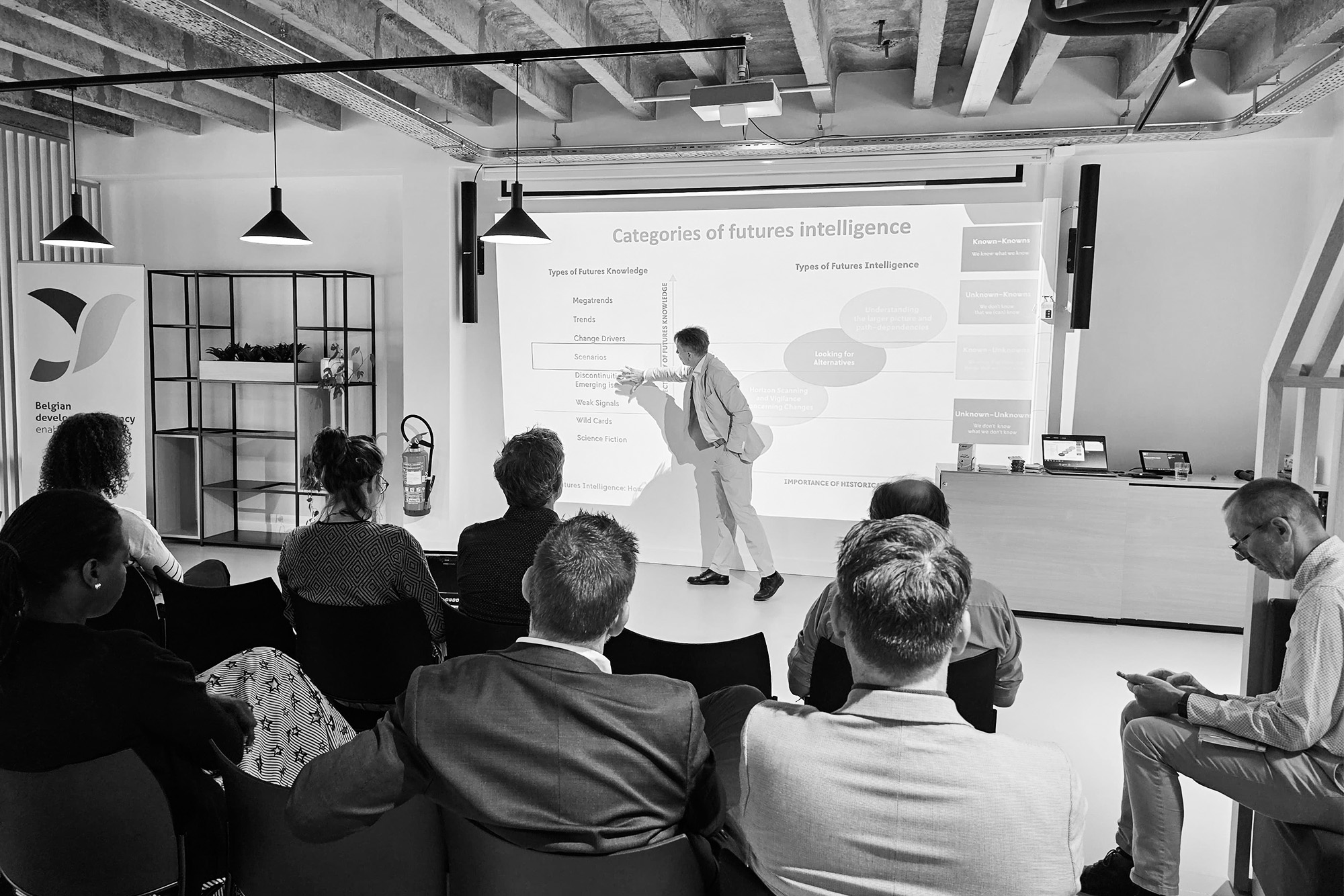
HyphenYou have talked about academia, politics and development, which are all quite different environments – how did you learn to move so easily between those different spheres?
Bart FonteyneThat came early in life. My parents moved to Brussels and bought land in a woodland as part of a rural area. I grew up in a neighbourhood of urban professionals located amongst a community of local farmers and when I was in school, it was such a mixed environment and I learned to switch between worlds. I also changed schools often, travelled widely, and went backpacking alone as a teenager. By 17, I was in Istanbul hitchhiking, and then when I was 20, I spent a year in South America. Those experiences taught me resilience and how to connect with people.
When I deal with ministers or senior officials, I remind myself that they are people coping with problems. I prefer to act as someone who can bring options rather than be the one in the hot seat. Being number two allows me to do creative work, think out of the box, and deliver solutions without the day-to-day burdens of leadership.
I can meet with a minister one day and camp in the desert with friends the next. Switching between environments keeps me alive and grounded, so it’s just knowing how to adapt and understanding that nothing is absolute.
HyphenSpeaking of adapting, you have worked with us for a few years now – how do you remember those first interactions?
Bart FonteyneI was first approached three or four years ago and we had a few discussions about a couple of projects in the Middle East that didn’t come off, but the link was established.
After that, I was asked to coach the new head of an agency that one Middle Eastern country was planning to launch. The person chosen for the job didn’t have a strong background in international cooperation, so I designed 14 sessions with Hyphen. We built a proper curriculum, not just informal coaching, and structured it around my career experiences. Hyphen also suggested reading lists, but in reality, he wanted to hear the lessons directly from me.
Since then, I’ve worked with Hyphen on various proposals and other projects. For example, they organised an event at which I gave a one-hour presentation to a room full of senior figures – apparently the biggest turnout they had ever had. They printed my bio and slides in a professional booklet, presenting me as a keynote speaker. It was impressive packaging, but also backed by substance.
What I appreciate is that they understand how to capitalise on me. Other consultancies often treat experts as names for bids, taking a margin on your salary and little more. With Hyphen, it’s different. They know how to present and stage your value properly.

HyphenHow would you describe your experiences with us?
Bart FonteyneWhat struck me working with Hyphen was the support. For instance, for the coaching curriculum, I suggested we needed a geopolitical timeline to link with international cooperation trends. The next day, one of their team had drafted it already, so I could refine instead of starting from scratch. I had never worked like that before – normally I had to do everything myself so that was refreshing – and yes, I even got to fly business class, which in development work is rare!
Their way of working is different, too. In my world, proposals are heavy, procedural documents. Hyphen can turn things into 10 clear slides – quick, sharp, effective. I feel that with them I’ve stepped up a level. They move fast, sometimes faster than I was used to, but I adapted. It’s energising.
HyphenThinking about life away from work, you mentioned at the beginning that you like music – what else do you enjoy doing?
Bart FonteyneI love reading about geopolitics and politics. I enjoy stories with many layers, like crime sagas or dramas about power. They fascinate me because they require intelligence and constant survival – much like politics. I also write songs, make music, and enjoy the sun, the gym, and keeping structured routines. Short-term work can lack rhythm, so I build my own guardrails.
Travel is another passion. I look for special experiences – jungles, deserts, places off the beaten track. Soon I’ll be travelling to Cambodia and Vietnam, where my daughter lives, and we’ll go on a trip together. Southeast Asia is another world altogether, completely different from the Arab world or Latin America, so that will be exciting for us.
(This interview has been edited for clarity, brevity and client confidentiality.)